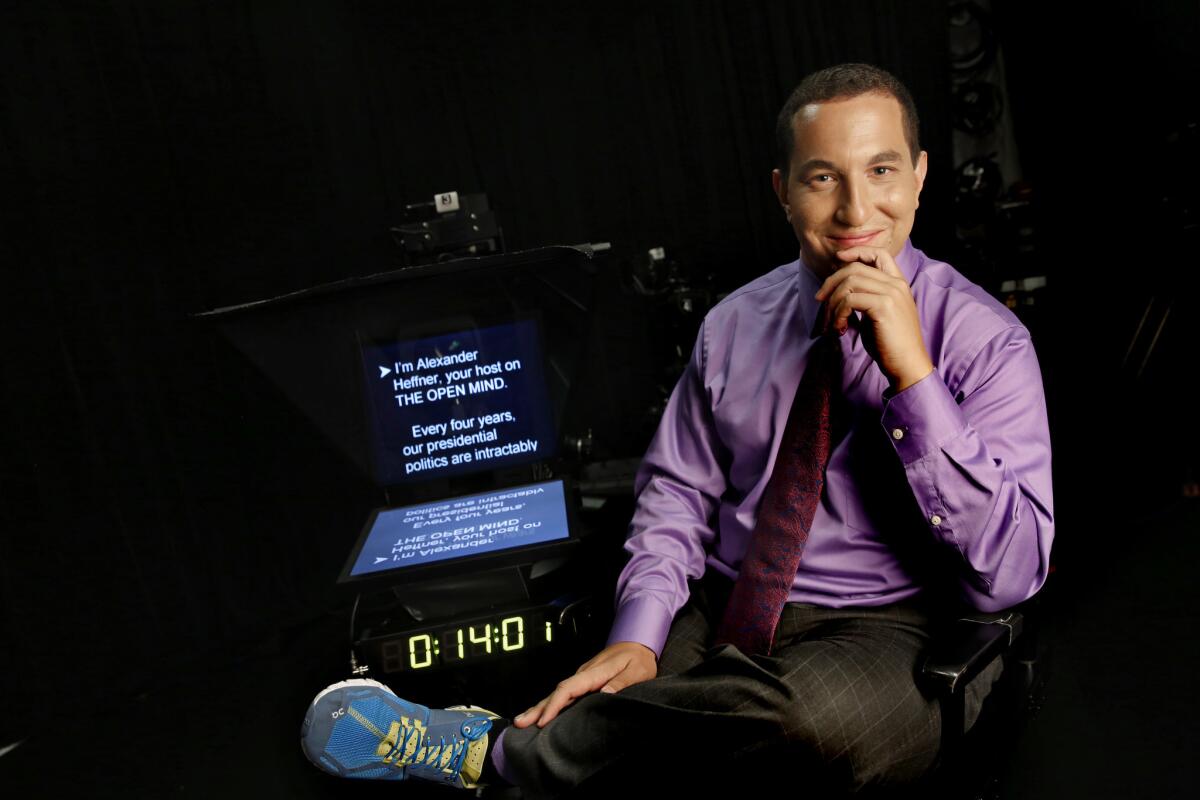‘The Open Mind’s’ Alexander Heffner talks about the ideas that drive his show

Alexander Heffner is talk host of the new show “The Open Mind,” recorded at CUNY TV station in New York.
- Share via
Bringing a serious-minded public affairs program to TV might seem like a thankless task, especially in today’s tumultuous, ratings-obsessed media environment. But 25-year-old Harvard grad Alexander Heffner insists he’s ready to bring sober discussion to Americans used to the screaming matches on cable news.
Heffner’s talk show, “The Open Mind,” based at WNET-TV in New York, this month is expanding to 150 stations nationwide, airing in the Los Angeles area on PBS SoCal at 9 a.m. Fridays and 12:30 p.m. Sundays.
SIGN UP for the free Classic Hollywood newsletter >>
Your grandfather, Richard D. Heffner, first telecast “The Open Mind” back in 1956 and was its guiding force until his death in 2013. How did it happen that you took over the program?
My grandfather had a vision for succession, and that was me. I was spearheading a Knight Foundation project for a student-reported website covering the Obama administration and he had seen me surface on cable television. In 2012, he said, “Why don’t you come to ‘The Open Mind’ and discuss this?”
He was a college history professor who, among other things, wrote “A Documentary History of the United States,” which is still used as a text today. But what might interest Americans even more is that for many years he ran the ratings board at the Motion Picture Assn. of America, which puts the PG and R ratings on films.
He evaluated films with a kind of in loco parentis attitude — “in place of the parents” — which was his abiding conviction.
Indeed. And sometimes that led to trouble with filmmakers. The director and producer of “Scarface” — the violent, profanity-laden 1983 gangster movie with Al Pacino — accused him of having a personal vendetta against the film after it was threatened with an X rating. Your grandfather said he felt “responsible to parents.”
He was a champion of free thought and freedom of expression, but he was also conscious of the vast implications of what Newton Minow called “a vast wasteland” of ubiquitous media presence. He worked with Edward R. Murrow and the giants of broadcasting’s beginnings. He carved out an important niche that we continue to champion, public media.
“Open Mind” has always had an East Coast bent, but what does going nationwide mean?
The exciting piece of it is that we’ll be opposite the Sunday political shows in most major PBS markets. It’s our mission to be an alternative to the left-right paradigm and instead have an ideas-driven — rather than poll-driven — Sunday show about public affairs. We’re excited about being an alternative platform to network and cable political theater.
The opening of your show is distinctive. It features a graphic that looks borrowed from a 1960s educational film, of a rotating silhouetted head against a black background. There is a jazz flute playing.
My grandfather used to call it “mental health music.” I’m so proud of the title sequence. It’s attractive to a younger cohort, but the historical vantage point is preserved.
You cultivate an eclectic mix of guests. Recently you’ve ranged from Democratic senator and presidential candidate Bernie Sanders to pop musician Aloe Blacc to bestselling novelist James Patterson. But no one gets roughed up too badly.
Non-adversarial face-to-face conversation can more meaningfully stimulate a meeting of the minds than the commonly elicited talking points.
We always strive to entice our audience with a provocative exchange. But a commitment to civic education first and foremost leads me to ask questions differently, I think, toward the goal of a more workable government of, by and for the people.
As the youngest host on commercial or public television, I’m focusing especially on public policy in connection to a new generation of Americans. We’ll have Maria Freire, from the National Institutes of Health, come on to talk about how the next phase of the Human Genome Project can prepare us to treat disease more effectively. I’ll also be exploring the intersection of millennials and the 2016 presidential campaign. So this fall we will have on Frank Fahrenkopf and Michael McCurry of the Presidential Debate Commission, Szelena Gray of Run for America, John Opdycke of Open Primaries, Ben Rattray of Change.org and Annika Savill of the U.N. Democracy Fund.
Last spring you interviewed Sanders shortly before he announced his White House run. He seemed a bit cranky and even corrected your opening statement, when he claimed that the GOP wanted to go far beyond the Citizens United Supreme Court case, which has been criticized for opening the door to more extensive campaign fundraising in elections. Was he tough to interview?
I think that’s just his shtick. I found him to be quite gracious, even in response to my questions. It’s true that he didn’t want to grapple so much with identity politics. But his pre-candidacy exchange on “The Open Mind” may have given him more room to think about how to position himself in the ideological mainstream.
What about Donald Trump? Is he going to turn up on the guest list?
I haven’t invited Trump on the show yet but would welcome a more intellectually rooted conversation with him on economics. He cites his Wharton education frequently. So that begs the question, what did he learn there that could be applied to the betterment of the country? He says his projects will be hugely successful and under-budget, but journalists haven’t asked for models within the Trump Organization.
Twitter: @scottcollinsLAT
More to Read
The complete guide to home viewing
Get Screen Gab for everything about the TV shows and streaming movies everyone’s talking about.
You may occasionally receive promotional content from the Los Angeles Times.







